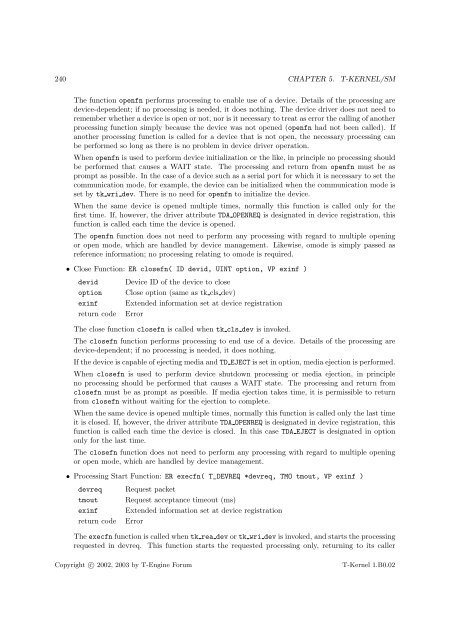T-Kernel Specification (1.B0.02)
T-Kernel Specification (1.B0.02)
T-Kernel Specification (1.B0.02)
You also want an ePaper? Increase the reach of your titles
YUMPU automatically turns print PDFs into web optimized ePapers that Google loves.
240 CHAPTER 5. T-KERNEL/SM<br />
The function openfn performs processing to enable use of a device. Details of the processing are<br />
device-dependent; if no processing is needed, it does nothing. The device driver does not need to<br />
remember whether a device is open or not, nor is it necessary to treat as error the calling of another<br />
processing function simply because the device was not opened (openfn had not been called). If<br />
another processing function is called for a device that is not open, the necessary processing can<br />
be performed so long as there is no problem in device driver operation.<br />
When openfn is used to perform device initialization or the like, in principle no processing should<br />
be performed that causes a WAIT state. The processing and return from openfn must be as<br />
prompt as possible. In the case of a device such as a serial port for which it is necessary to set the<br />
communication mode, for example, the device can be initialized when the communication mode is<br />
set by tk wri dev. There is no need for openfn to initialize the device.<br />
When the same device is opened multiple times, normally this function is called only for the<br />
first time. If, however, the driver attribute TDA OPENREQ is designated in device registration, this<br />
function is called each time the device is opened.<br />
The openfn function does not need to perform any processing with regard to multiple opening<br />
or open mode, which are handled by device management. Likewise, omode is simply passed as<br />
reference information; no processing relating to omode is required.<br />
• Close Function: ER closefn( ID devid, UINT option, VP exinf )<br />
devid<br />
option<br />
exinf<br />
return code<br />
Device ID of the device to close<br />
Close option (same as tk cls dev)<br />
Extended information set at device registration<br />
Error<br />
The close function closefn is called when tk cls dev is invoked.<br />
The closefn function performs processing to end use of a device. Details of the processing are<br />
device-dependent; if no processing is needed, it does nothing.<br />
If the device is capable of ejecting media and TD EJECT is set in option, media ejection is performed.<br />
When closefn is used to perform device shutdown processing or media ejection, in principle<br />
no processing should be performed that causes a WAIT state. The processing and return from<br />
closefn must be as prompt as possible. If media ejection takes time, it is permissible to return<br />
from closefn without waiting for the ejection to complete.<br />
When the same device is opened multiple times, normally this function is called only the last time<br />
it is closed. If, however, the driver attribute TDA OPENREQ is designated in device registration, this<br />
function is called each time the device is closed. In this case TDA EJECT is designated in option<br />
only for the last time.<br />
The closefn function does not need to perform any processing with regard to multiple opening<br />
or open mode, which are handled by device management.<br />
• Processing Start Function: ER execfn( T_DEVREQ *devreq, TMO tmout, VP exinf )<br />
devreq<br />
tmout<br />
exinf<br />
return code<br />
Request packet<br />
Request acceptance timeout (ms)<br />
Extended information set at device registration<br />
Error<br />
The execfn function is called when tk rea dev or tk wri dev is invoked, and starts the processing<br />
requested in devreq. This function starts the requested processing only, returning to its caller<br />
Copyright c○ 2002, 2003 by T-Engine Forum<br />
T-<strong>Kernel</strong> <strong>1.B0.02</strong>












![[8] 2002 e-business-strategies-for-virtual-organizations](https://img.yumpu.com/8167654/1/190x257/8-2002-e-business-strategies-for-virtual-organizations.jpg?quality=85)


